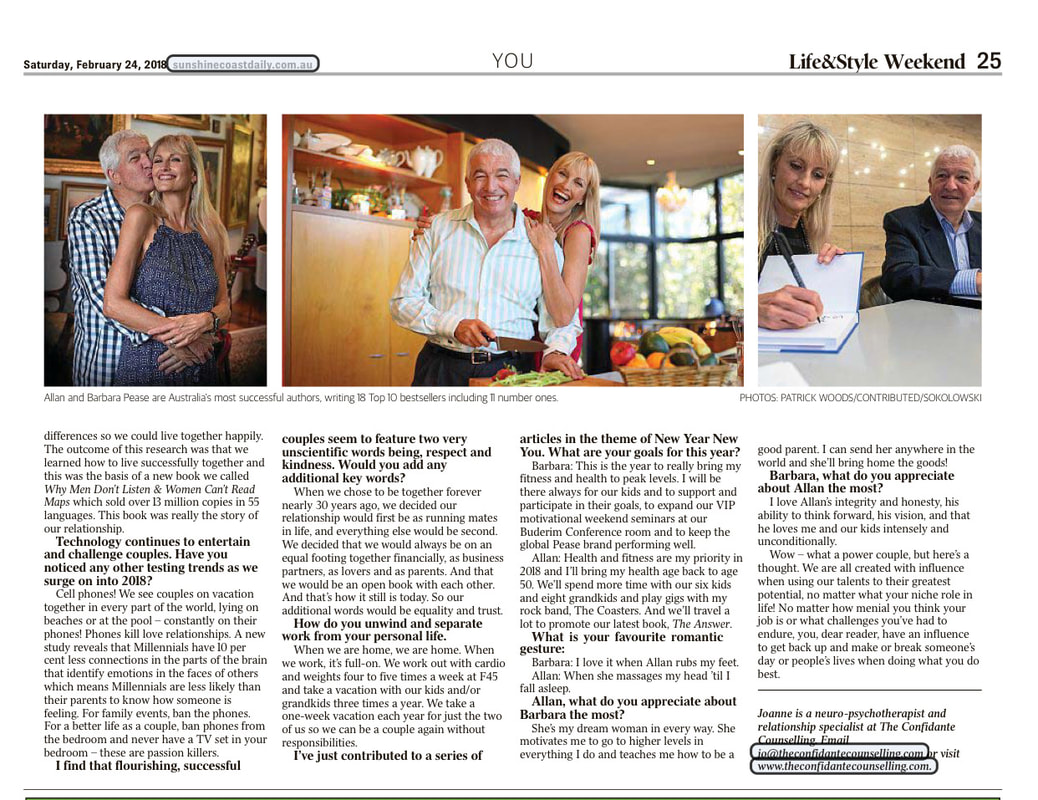|
TheConfidante In the Media
I’m the first to admit to being stunned that Easter has just whizzed past, along with the first part of 2015. So how’s your MakeItHappen in 2015 thus far? Here are a few facts: - Everyone gets the same twenty-four hours in a day. - If you have competition, they have no more hours in a day than you. - The richest person cannot buy even one more minute of time in a day! - Only YOU can manage yourself and activities more effectively. The media tells us we can have and do it all. Some of us feel a great weight of expectation to get everything done perfectly. If you’re up at “Ridiculous O’Clock” everyday, loading the washing machine, preparing breakfast, answering emails, hash tagging, making beds, maybe wrestling children to school or activities, it’s no wonder you arrive at work, home or wherever frazzled, sweaty and feeling like it’s nearly bed time! If you drift off each night, worrying about how you are going to get everything done by tomorrow, maybe it’s time to find the superhero within you! (Whilst Spiderman and Catwoman might have appeared to successfully juggle normal life with fighting bad guys and falling in love, they probably never did their own washing!) Effective Time Management is a common barrier to a fulfilling lifestyle for many of our clients. It’s all about behavioural change and learning how to spend more time acting instead of reacting.
You may just need a little help in managing time effectively and learning to say “No, I just can’t do that” without experiencing guilt. Could it be that those admirable Superheros in your circles, have simply mastered the art assertiveness and practice saying “No -I can’t do that”. The great news is you've also now got: THREE steps to success TEN Essential Time Savers FOUR Important Considerations, then a summary of; FIFTEEN Top Time Tips to help rein in your time to achieve more. Step ONE: Where did that day go?
Quickly assess what you do each day, over a week. (Bit like that food diary you’ve never kept but this one is about your output.) Where could you be spending your time more effectively? Highlight just how much you really do achieve each week. As an exercise (as if you needed something else to do!) print off a daily sheet for 7 days. Try some like THESE. Try and record by the hour what you fit in (include social media, emails, phone calls, making sandwiches, feeding the chooks, filing a report, thumb wrestling, meetings, doing the washing, collecting the children – everything). At the end of each day, tally up the hours spent in these main categories: 1. Health 2. Family 3. Financial 4. Intellectual 5. Social 6. Professional 7. Spiritual By the end of the week you should have a general view as to what is taking up too much time, what you don’t have enough time for and where you need to take a break. If you add up your tasks and you’re even more time poor that you thought, consider these words from Michael Altshuler, “The bad news is time flies. The good news is you’re the pilot.” Heard of Stephen Covey’s feature of the so very insightful “Rocks and Sand in the Jar” which highlights the importance of prioritising. Step TWO: Get more hours in the day (without winding back your clock!) Whether you work at home, study, self employed or work for someone else, work hours will probably take up a great deal of your time. Ideally, the working day should be eight hours long (including breaks) but sadly, many work 12 hours a day or more. No matter what your position is, how much money you earn or whether you adore working or not, this is not healthy, for your physical health, mental health or your relationships. Now take another look at the part of your time inventory that relates to work or study and Get OUT! That is, Optimum Use of Time: Consider if you are efficiently managing your: PRIME time: the hours you allocate to work ie 8am – 6pm SECONDARY time: hours that support your Prime time ie. Planning lunch, scheduling appointments, setting up time frames for study assignments, preparing Children’s activities, clothes for the week. TERTIARY time: rest, relaxation and rejuvenation How much time does each scheduled task take during your day? (Be sure to make notes of any interruptions.) Label tasks and appointments as either “Optimum Use of Time” Primary, Secondary Support or a Tertiary activity. At the end of each week, use this information to:
If you don’t feel like you’re up to that task, try Stephen Covey’s Time Management Grid. Step THREE: Incorporate these Essential Time Saver tips:
1. Consider: Why do you Procrastinate? Many procrastinators tend to be perfectionists. Anything too challenging can bring them to a stand still and shut down. The emotions associated with certain “to do’s” can be overwhelming. Many people avoid the task to avoid the emotion. Fear can be paralysing. Fear of other’s reactions, fear of change, fear of risk, and even fear of success can immobilize some people. If you are procrastinating: - Identify the emotions with the task. Is it fear and is it healthy? - Try imagining the task completed. How do you feel? - Try breaking the task down into pieces and doing a part each day. - Put the task on your calendar or in your schedule. - Ask people you admire how they avoid procrastination! - Start your own personalised “No Procrastination Program" incorporating deadlines. 2. Consider: Is technology your time management friend or foe? We often spend so much time packing extra things in. With instant life (that’s how we live) we can order our food on the go, email work whilst parked outside school or write a report on the train. Technology helps us do all these things. Our laptops, smart-phones, tablets and countless other tech devices are all meant to be making our lives easier (and there are plenty of useful apps and programs that we can use to plan and manage tasks). Do you ever wonder if life was simpler and easier when all we had was a wall phone and a set of Encyclopaedia Britannica? If you find that chunks of your day slip away because you were looking at that surfing dog clip that someone sent, you’re not alone. It’s OK to love these things and we all want to be ‘in the loop’ but if social media is distracting you from more important tasks, then set aside a specific time, and a time limit, to enjoy these things and when you’re done, switch it off to avoid distractions. Some people suggest you stand up while you check your emails or use social media! Give yourself a timeframe then get on with everything else. It trains you to only look at emails sporadically and from a different view point. 3. Consider: Chillaxing By allocating time every day to do certain things and sticking to a routine (no, this doesn’t allow for being impulsive) you will teach yourself not to overdo things. Additionally, the weekends shouldn’t be for work (unless you work weekends and have days off during the week). These should be for family, for you and for friends, for looking at dancing monkeys on the internet! Even more importantly – rather than running around like a headless chicken all weekend trying to please all and sundry, set aside a couple of hours of proper relaxation time. This is for that wonderful massage, sport, the walk in the park, a couple of hours enjoying the ocean….watching a movie, sport or reading. You MUST unwind. Otherwise every week is literally the treadmill we all talk about and you will never learn to get off. That’s when illness creeps up and not only physical illness but mental illness because that’s when people become depressed and even lonely. Then we are prone to thinking “Is this it?” It’s not. It can be so much more. 4. Consider: Start Small with a Big Ending If you really are resolving to change things, here’s another idea from Stephen R Covey, “If you want to make changes to your life then start small.” It’s all very well making changes but if they are too big, you will fall at the first hurdle. Once you’ve managed to make the change you’ve promised yourself, you can build on it. So, for example, if you want take more time out to get fit but feel swamped by everything else, schedule 30 minutes twice a week to start and go for a power walk. Once you’ve been doing this for a few weeks and you’re enjoying it – build on it, incorporate another session or add in another exercise. If you have promised to cook a proper meal for yourself every night, don’t beat yourself up if you only manage to do this once before giving up. Finally – REWARD yourself when you reach even your smallest changes to becoming proactive with your time! Our Summary 15 Top Time Tips: 1. Start with the end result in mind. Positively think about what you do have time for and less what you don’t have time for. 2. Learn to Love LISTS to ease the panic when you don’t know where to start. (Those little ticks signal a sense of achievement!) 3. Prioritise items into urgent, important, fairly important and not important with a Time Management Grid. 4. Evaluate your boundaries and consider do you need to learn to say “No”. 5. Check emails and social media standing up at allocated times to avoid interruptions and a world trip around the web! 6. Formulate your own personalised “No Procrastination Plan” incorporating time frames. 7. Have a set time for finishing work and stick to it, unless urgent. 8. Schedule much of your business social media posts in advance 9. Get a good 7 hours sleep at least. If you feel rested, you will breeze through much easier. 10. “Reset” by having lunch! Stop eating on the go and schedule at least half an hour. 11. Have an organised desk or home. Chaos breeds chaos. A tidy environment makes a tidy mind! 12. Exercise for 10 minutes a day at least to regain energy and focus. 13. Verbalise time management blocks with any mentors or your trusted Counsellor 14. Review your Optimum Use of Time regularly to reward your achievements and adjust any old behaviours. 15. REWARD yourself along your Time Management journey for even the smallest behaviour changes Now you have nailed Time Management, being the final topic of our #MakeItHappen series. Didn’t have TIME to read the first parts? Simply go to: About Joanne Wilson, TheConfidante Counselling: Joanne Wilson is a professional counsellor and psychotherapist with an interest in relationships and pre- marriage therapy. She has produced her own book, Pearls of Wisdom from the Thriving Thirties, and presented a series of relationship seminars on the Sunshine Coast, with support from Immanuel Lutheran Church. For more information, contact Joanne Wilson on 0499 991 884 or [email protected] |
Joanne WilsonJoanne will be your Confidante, enabling you to speak freely in complete confidence and serenity. An integrated approach tailored to your specific needs will be utilised.
Categories
All
Archives
October 2023
|
Joanne will be your Confidante, enabling you to speak freely in complete confidence and serenity. An integrated approach tailored to your specific needs will be utilized. Approaches such as Psychobiological Approach to Couple's Therapy (PACT), Cognitive Behavioral Therapy, Solution Focused Therapy and Emotionally Focused Therapy may be incorporated.
Joanne WilsonRelationship Specialist for individuals and Couples online around the world and servicing areas for virtual sessions around Australia and servicing many clients in Queensland including Caloundra, Noosa, Noosaville, Buderim, Mountain Creek, Gympie.
|
Quick links |
|
Queensland - Australia
0409 909 933
www.relationshiprejuvenator.com
|
|
©
2017-2023 The Confidante Counselling . All Rights Reserved
Web Design by Debbie Navarro





 RSS Feed
RSS Feed









